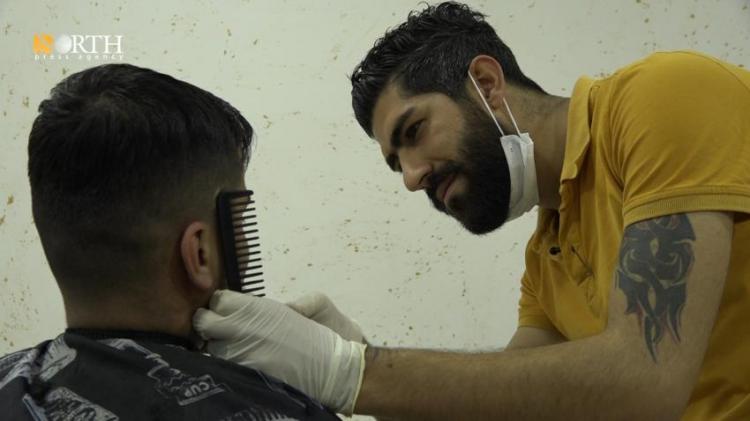An old custom of barbers returns to Qamishli, with continued measures against coronavirus
Qamishli –North-Press Agency
Sarbast Hassan
With the prolonged period of the lockdown in the areas of the Autonomous Administration, and its extension for a second time, in addition to the pressure of living conditions and their families’ livelihood, some barbers resort to following an old custom that was known by their peers in the profession in the past.
"Customers call us to shave for them either in their homes or elsewhere, and we have no choice because work is our only source of livelihood," says the 30 –year- old barber Ahmad Kokani to North-Press. He revealed that he, like others, had to work in secret after he closed his shop in Qamishli since the beginning of the lockdown about a month ago.
Kokani adopts the barbers' habit in the region in the past, when they used to go to the homes of their customers, in a time when barbershops were not available as they are today.
The majority of barbers depend on daily income for their livelihoods, so Ahmad believes that the length of the ban has greatly affected his financial situation under the current circumstances, especially as he was displaced from his city of Afrin as a result of the Turkish invasion on the region in 2018.
Ahmad has been practicing his profession, which he says he inherited from his grandfather, for about 17 years, and that it is currently his only source of income. "With the start of the quarantine, we stopped working and abided by the decision, because this was for our own safety and that of the customers," he explained to North-Press.
The lockdown imposed by the Autonomous Administration on the northeastern regions of Syria, and the closure of shops, has had a negative impact on the economic situation of most professionals in the region.
Ahmad indicates that the custom of shaving in houses was followed before the ban as well, but it was limited to certain cases of sick or injured people who were not able to visit the salon. "Whenever I enter a new customer’s house, I remember my grandfather and his tales of shaving," he said with a slight smile.
Ahmad recalls how his grandfather, at that time, was being paid other things instead of cash by the customers, "such as fruits from their lands, or wheat, and so on."
Despite visiting the homes of his customers, the barber affirms his commitment to the preventative measures against coronavirus.
He explains: "The prevention measures are simple, such as using gloves and masks, in order not to expose the customer to danger as well as to protect myself."
"Of course I sterilize the entire kit, such as the blade and the scissors, before shaving for each individual customer, and I change gloves and masks every time," Ahmad says.
Ahmad, like most of his colleagues in the profession, hope that the Autonomous Administration will allow barbers to open their salons, "for at least three hours a day." He believes that opening a limited number of salons may cause overcrowding, which may increase the risk of the spread of the virus.
With the prolonged quarantine, it seems that many barbers in the city of Qamishli resort to secretly practicing their work, even if they tend to close the doors of their shops for fear of being subjected to the fine required by the Administration's decisions against violators of the ban.
On Tuesday, the Autonomous Administration of North and East Syria issued a decision to extend the lockdown period to prevent the outbreak of the coronavirus epidemic for the second time, for another ten days.
While it allowed many shop owners and professions to carry out their businesses, barbers were not mentioned. Some media sources say that the Administration is considering a decision that allows the barbers to open their salons for one day per week, similar to the exchange offices, which open two days a week.

